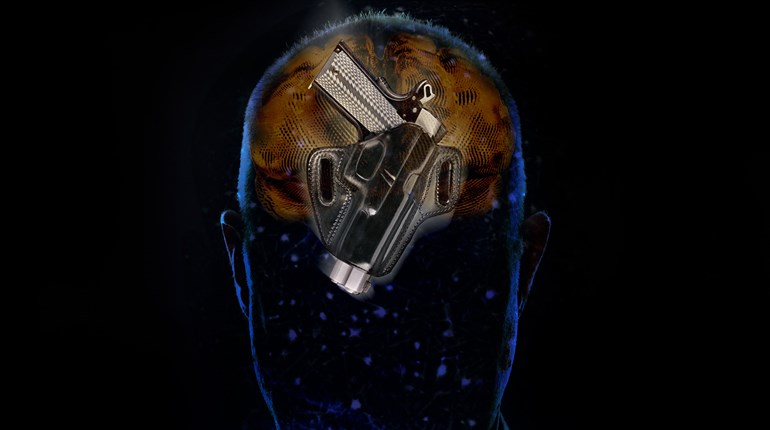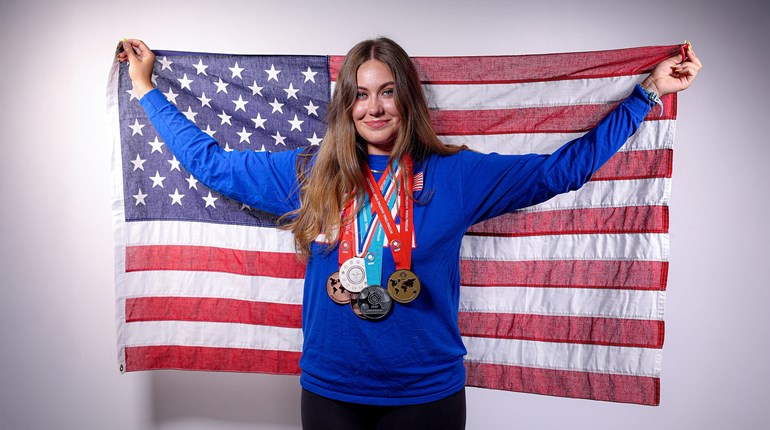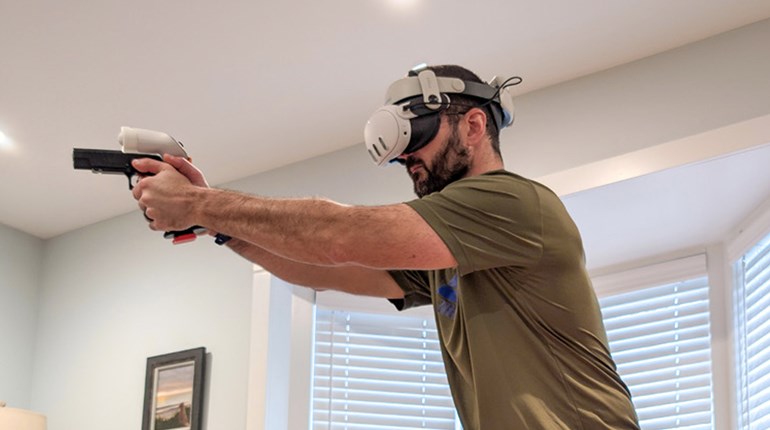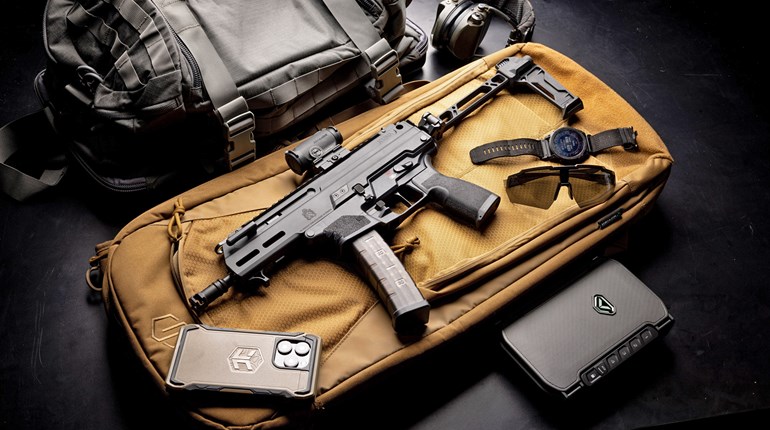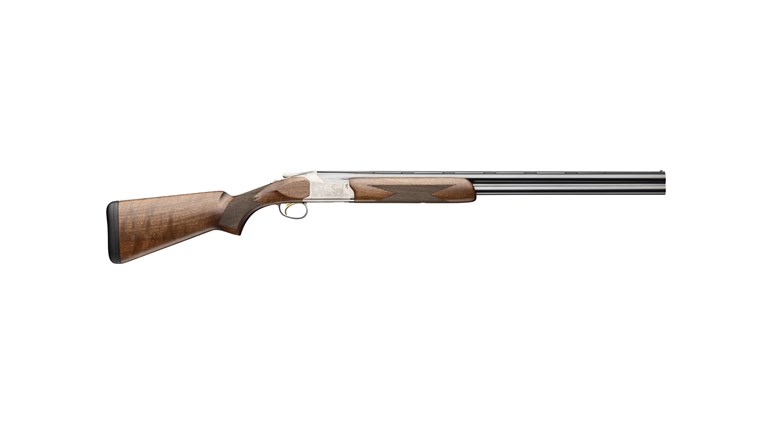
This article, "What Women Want," appeared as a feature in the February 2015 issue of Shooting Illustrated. To subscribe to the magazine, visit the NRA membership page here and select Shooting Illustrated as your member magazine.
It’s an age-old question. What do women want when it comes to guns? In this case, we asked several women—from accomplished professionals to a neophyte shooter—what they wanted.
These women answered the questions without collaboration. You might be surprised by some of the similarities in their responses—and, some of the differences.
Meet the Women

Christine Cunningham
Christine Cunningham is a native Alaskan outdoor writer, with a day job in municipal government. Author of “Women Hunting Alaska: True Stories of Alaska’s Women Hunters,” she routinely introduces women to shooting and hunting through various clinics and scheduled hunts.
Cunningham has been shooting since her first duck hunt in 2006. “After earning the name ‘Case-a-duck Cunningham,’ (it would take me a case of shells to land a single duck), I started shooting trap and skeet on Sundays at my local gun club to improve my skills,” she said. “This led to the purchase of shotguns specific to trap and skeet as well as upland game. I started shooting rifle for predator hunting and added pistol when I began participating in the club’s USPSA matches. I built my first AR-15 this fall.

Lucretia Free
Lucretia Free publishes The American Woman Shooter, a publication that champions women in the firearm industry as it serves to educate women about firearm selection, safety and self-defense. Free runs the publication from her home base in Tucson, AZ. She also recently launched “Gun Powder and Diva Power” fashion shows across the country. She has been shooting for about 18 months.

Marcy Harris
Marcy Harris recently added “learning to shoot a handgun well” to her bucket list. She started shooting rifles with her dad as a young girl, and later earned Marksman qualification with an M16 while in the Air Force. She participates in league shooting through the local DIVA WOW (Women Outdoors Worldwide).
“I only started shooting handguns about five or six years ago through DIVA WOW,” she said. “Since then I have participated in handgun leagues, in my first shotgun league and recently won an AR-10 in a raffle.”

Lea Leggitt
Sixteen-year-old Lea Leggitt has grown up hunting and shooting, since her family owns Wolf Creek Outfitters, a Colorado/New Mexico hunting guide service. Leggitt is coming into her own and recently became a Colorado state representative for New Generation Outdoors. She also participates in the NRA’s Youth Hunter Education Challenge, traveling to compete in national events. She has been shooting since the age of 6.

Il Ling New
Il Ling New is well known in the shooting world for her accomplished skills as a rangemaster and shooting instructor at Gunsite Academy. She grew up in the hunting world, since her family also owned a guide service. She lives in Idaho when she’s not teaching on site in Arizona.
New said: “I’m not in favor of ‘segregating’ women in the shooting sports. I am, however, a supporter of programs to help novices find their way in firearms and related activities. I find too often women are presented with lightened information, technique, gear, etc. This should not be.”

Eva Shockey
Growing up as professional hunter Jim Shockey’s daughter, Eva is no stranger to firearms. She co-hosts “Jim Shockey’s Hunting Adventures” on the Outdoor Channel, as well as hosting TV specials and red-carpet events. Recently, she graced the cover of Field & Stream.
Shockey, who has come under intense scrutiny and even harassment for her hunting and shooting, explains why: “Female hunters are representative of a huge evolution taking place. Many anti-hunters are seeing for the first time that hunting isn’t just for men, but for people spanning all demographics. Female hunters have the potential to expand the world of hunting in a big way.”
What do women want when they walk into a gun store?
“In a gun store, I want to be treated the same way I would be treated in a shoe store or anywhere, really. I’ve heard stories and have stories where that hasn’t happened, the ‘little lady’ treatment or other kinds of discrimination. For the most part, we want the same thing the person behind the counter does—to transact business. And we want someone behind the counter who knows something about guns and how to handle them correctly. As more gun stores are rewarded for their ability to create good experiences for female customers, it’ll become obvious that’s what we are—really good customers,” Cunningham responded.
Free added, “I enjoy my shopping experience in bright stores with wide aisles and helpful staff. There are so many stores that I go into that are dark places with no attention to merchandising or interior touches that would make them more welcoming. I often think these are the last places some owners expect women to frequent...they must be the last bastions of male dominance.”

“What I don’t want is to be made to feel uncomfortable,” added Harris. “New shooters already feel uncomfortable as it is. We don’t need anyone trying to help us in that area. If we forget the name of a particular part of a weapon, or give the wrong name, please provide the correct one in a helpful manner, not in a condescending manner. I can honestly say I’ve never been made to feel that way, but I’ve really worried about it before going in. I can scuba dive with sharks better than I can walk confidently into a gun shop.”
Leggitt kept her response short: "I think women want gun stores to have more ladies items. Lady-size guns instead of just big hand cannons.”
“More knowledgeable staff—male and female. Retailers are in desperate need of staff who truly understand firearms, shooting, ballistics and customers’ needs within these categories,” New added.
Shockey replied: “My dream would be to walk into a gun store and see as many female-friendly hunting and shooting products as there are products for males. Specifically, products like guns with shorter stocks on them designed for smaller female frames, archery equipment that is suited to the size and draw weight of a female and hunting clothing that is made for our shape...basically everything that can provide women with the same comfort as men get from the unlimited amount of hunting gear, apparel and accessories that they have access to."
What do women want on a gun range?
“I remember walking across the range one day with my gun bag, which was rather large since it included several pistols, magazines and ammo. All the shooters were male and standing in a group when one of them yelled out, ‘Is that your makeup bag?’” recalled Cunningham.
Free likes the group concept and wishes more ranges would be open to this type of shooting. “I appreciate why some ranges are very rigid, but it would be nice to have a section of the range dedicated to groups that can accommodate a class or instruction that falls outside of the assumption that people go only as individuals. I would like to shoot more in groups with other women.”

Harris takes some of that apprehension from the gun store and applies it to the range. “At ranges, if the staff doesn’t recognize us, they should ask if we’ve ever shot there before. If not, explain the layout to us. Ask us what they can help us with. Suggest things. We don’t always know what we need to ask for. And make an effort to make us feel comfortable.”
Lest you think we’ve gone on a man-bashing angle, here, know that Harris said, “Sometimes it’s ladies working at the gun ranges, rather than the guys, who make me feel intimidated.”
New agreed with the idea of special areas for new shooters on the range: “[Ranges should] have some new-shooter friendly staff and lanes.”
“I would love to see gun ranges that urge women to join by offering programs that appeal to them—whether that is a beginner’s class on gun safety or a self-defense class based on handling a firearm,” Shockey answered. “Even if the ranges offered one night a week for women-only, or classes for groups of girls—anything that allows women to feel comfortable on the range is a great place to start.”

What do women want gun and gear manufacturers to know?
“The most important thing in a firearm is fit and feel. Back to the shoe metaphor, no one else can pick out my shoes or my guns,” Cunningham replied. My female friends have told stories about being given guns by well-meaning partners that they could not imagine shooting or are not comfortable shooting. That’s no good. Being able to try a variety of firearms and find the one that fits like a glove or we can get excited about is what we want.”
Free expanded on Cunningham’s point of view: “I am certainly no expert since I am a new shooter, but I do know what feels good in my hand. I have long fingers, but need to continue to build my upper-body strength. What works best for me is a gun that feels comfortable in my hand, but that is not so overwhelmingly powerful that it creates a lot of recoil.”
Harris wants “a gun that will be dependable and predictable. Something I know will react the same way every time I go for it. I want something that’s comfortable in my hand, not too heavy to hold and something I’ll be able to easily conceal on my body in various places.”
Harris then added that women’s body-wear holsters—belly bands and thigh-worn rigs—need to be constructed of the “best water-wicking, soft-on-your-skin-yet-holds-firmly material available. No one wants to be wearing a dress in the middle of summer with a big 5-inch ring of sweat around her middle and have everyone wondering ‘what’s going on with her?’”
Already a confident shooter, Leggitt’s experience has led her to conclude that “...women want protections. I think they want something they can feel confident in.” In relation to gear, she said, “Women want something that makes them look good and is comfortable and keeps them warm.”
New also brought up the shoe metaphor when it comes to what women want in a firearm: “I’ve said for years that guns are so much like shoes—they have to fit the person, the use and the occasion. The first is trickier; never mind the very basic mistakes of just handing the ‘lil lady’ the ‘lil’ firearm…it’s a matter of many other elements, such as balance (you can’t just hack a stock off and call it good), subtle fit issues (comb-width on long guns, for example) and ergonomics (just because the revolver feels good, doesn’t mean one has the leverage to press through that double-action trigger.”

What does she want when it comes to firearms instruction?
Cunningham likened a woman’s experience at a gun range or store to that in the instruction department. “We want the assumption to be that we came to learn, are capable of learning and that the environment is safe and engaging,” she said. “But, a lot depends on the level of confidence of the particular shooter. If it’s her first time handling a firearm, it takes more supportive instruction and a stepped approach. If it’s a group of women familiar with firearms learning a new discipline, the details are more interesting.”
“OK, I’ll say it,” stated Free. “Some instructors have a style that is very intimidating, especially to a relatively new shooter. Telling me what I am doing wrong without offering suggestions for improvement, demanding I memorize the safety rules and know the parts of a gun all within the first few minutes of a lesson is a bit overwhelming. I certainly recognize these as important, but maybe a little time to absorb it would be more effective.”
New teaches some women-only classes at Gunsite, and observed that women need the same training as men. “I try to deliver that in my women-only classes,” she explained. “We’re certainly capable of ‘understanding’ it, though some men seem to disagree and skip over technical elements. Women need to understand everything from how their firearms work, to how to clean them, to ballistics, to choosing ammo just as much as men do. I think it’s a huge disservice to assume we don’t want or need to learn these things.”
Shockey believes offering online programs helps make instruction more appealing. “Ultimately, the goal is to put more safe and educated shooters out there, so developing programs to make this happen is key,” she observed. “These days, people are time-constrained and can’t always find an opening in their schedules to take a course.”











